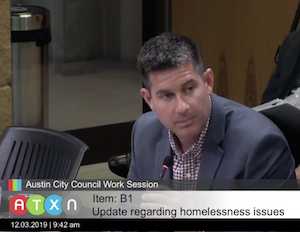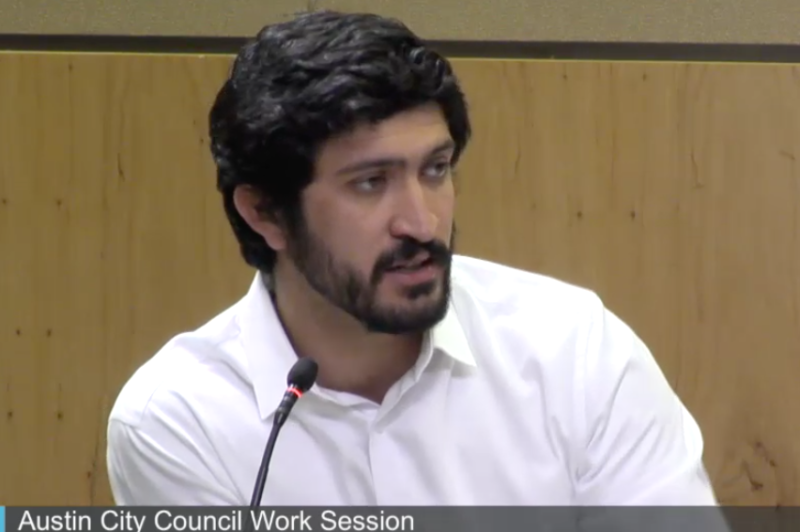Mayor Steve Adler and members of the Austin City Council today discussed plans to replicate “throughout the city” a strategy to purchase and convert motels into homeless shelters.
Last month the City Council unanimously approved the $8 million purchase of a Rodeway Inn off I-35, south of Oltorf Street, to make available 87 housing units for persons experiencing homelessness.
Assistant City Manager Rodney Gonzales, presenting to a City Council Work Session this morning, said that the city is now looking to purchase additional motel properties, which it would turn over to a nonprofit organization, the Ending Community Homelessness Coalition (ECHO).
ECHO would operate the motel shelters under a long-term below-market lease or services agreement. “It’s our intention to partner with ECHO and they’ve stepped up in a very big way to fundraise for maintenance and operations,” Gonzales said.
Matthew Mollica, Executive Director of ECHO, said that the Rodeway Inn is meant to serve as a “blueprint” for scaling the motel-as-a-shelter model.
“Once we have that blueprint set in place we’ll be able to replicate that pretty easily, over and over again, and through economies of scale we’ll start to decrease some of the costs associated with the operations.”
Gonzales added, “Eventually we want to turn these units into permanent support housing so it’s important for us to see whether these rooms can be converted to include a kitchenette.”
The Assistant City Manager noted that city staff are screening for-sale motels on the basis of a number of criteria, including the location, building condition, number of rooms, plumbing and utilities, and acquisition cost. “We certainly do not want an agglomeration of motels in any one part of the city. We are looking throughout the city,” he said

Responding to these presentations, the Mayor and several City Council members stressed that the motels should be purchased not just along the I-35 corridor but elsewhere in the city too, including in higher-income areas where there are not current concentrations of homeless persons.
Mayor Pro tempore Delia Garza said, “Just as we believe that affordable housing should be in all parts of our city, the same goes for these types of facilities as well.”
“From my understanding of where these next facilities will go, they will go in the majority minority areas of our city. I have concerns about that… when people live amongst different income levels it helps them thrive.” Garza recommended “equitably placing these in all parts of town.”
Mayor Steve Adler endorsed her suggestion, saying, “I want to very quickly endorse some of the points that the mayor pro tem raised… We have to locate these in districts other than districts 1 through 4… and I recognize that they’re potentially a premium cost in doing that.”
“We have to locate some of these in districts five through ten,” he added, referring to western parts of the city. “We need to provide more sticks-and-bricks locations if we’re going to do a housing first strategy.”
Council Member Greg Casar concurred, though he said eastside districts would also welcome the shelters. “I do think that getting to more hotels makes sense,” he said, pointing to potential economies of scale.
Doubts from Some Council Members
For her part, Council Member Natasha Harper-Madison pointed out that an existing homeless shelter in her district is underutilized because it is understaffed and underfunded.
Similarly, Council Member Kathie Tovo expressed some doubt over the strategy, asking what the “Plan B” would be if ECHO was unable to raise funds to cover the annual operating costs of the shelters.
“It’s not at all clear to me what the funding strategy is for funding operations and maintenance, operations,” she said. “Before we continue with this strategy I’d like to see a business plan for how these funds are going to be raised, because otherwise we’re going to end up with several pieces of real estate that are going to end up being vacant.”
Molica of ECHO responded in part, “We’re looking at raising about a million dollars per year per hotel,” of which about $300,000 would go toward operating the motels and $600,000 to $700,000 would go toward services.
He added that while the long-term goal is to renovate each motel unit by adding a kitchenette, there isn’t an immediate renovation need. “We will be moving people into the units as is,” he said.
Related Coverage:
